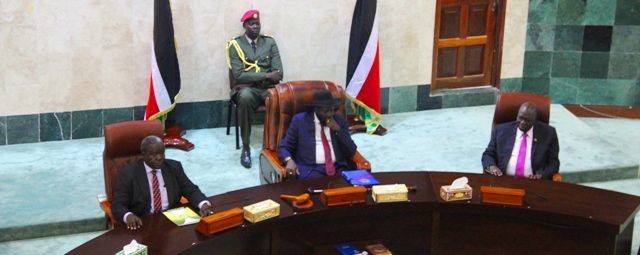Salva Kiir has announced that he will not step down as president of South Sudan, saying that he has set a ‘red line’ against his exclusion from a proposed interim government. Negotiators from different political parties and the main rebel faction are planning to form a unity government by mid-August.
He said this on Thursday during an address to members of both the National Assembly and the Council of States, the upper house of the parliament.
Kiir referred to an alleged plot to form the transitional unity government without him, explaining that some unnamed individuals and countries want to bring somebody else of their choice. “They intend to constitute a transitional government without me as the elected president,” he said.
He told the parliament, “It is a red line on this and my position is unwavering on this thing. Our people overwhelmingly elected me as their president and nobody has the right and power to remove me except the people themselves.”
The president did not specify who was pushing for his removal from office, but he said that these ‘individuals’ want the IGAD peace talks to end in ‘regime change,’ and they have interpreted the call for interim government as permitting the dissolution of the executive and the parliament.
SPLM-in-Opposition (SPLM-IO) is among the groups pushing for exclusion of Kiir from the interim government. Other politicians in the SPLM-G11 faction have also demanded the same.
Both dissident factions of the ruling party are considered ‘stakeholders’ at the talks, mediated by the East African organization IGAD, as are civil society and several small political parties. The involvement of these groups was agreed by Kiir and his rival the SPLM-IO leader Riek Machar in a deal reached on 10 June calling for the formation of an interim government within 60 days after ‘inclusive’ talks.
Machar himself has said that he is willing to stay out of the interim government. He reportedly conceded this point during a long face-to-face meeting with the president of Kenya, Uhuru Kenyatta.
In spite of the 10 June agreement, direct talks on the formation of the government have been delayed. Last week the president ordered his negotiating team in Ethiopia to suspend its involvement. He said that this move was in protest of remarks by one of the mediators who allegedly called him ‘stupid.’
On Thursday the president also said that his commitment to form a transitional government had been misinterpreted by some, revealing that some countries were plotting to sideline him during the upcoming talks and push him out of the new government.
“The formational of transitional government of national unity is the key factor in our roadmap to return South Sudan to peace and security and prosperity. But the understanding of some people and even countries out there are different and amounts to what they called ‘regime change’,” Kiir said.
Kiir said the dissolution of the national legislature is also a ‘red line’, arguing that the members of the assembly were elected representatives.
“Nobody on this earth will be allowed to dishonor their legitimacy, as the President of Republic of South Sudan I will never allow this thing to happen,” he said.
Photo: Salva Kiir, seated between the speakers of the two houses of the South Sudanese legislature, 19 June 2014
Gallery 1: Salva Kiir is greeted by the Speaker of the Assembly upon arrival at the National Assembly, 19 June 2014
Gallery 2: Members of parliament await the speech by President Salva Kiir, 19 June 2014
Gallery 3: The South Sudanese president addresses the legislature, 19 June 2014




